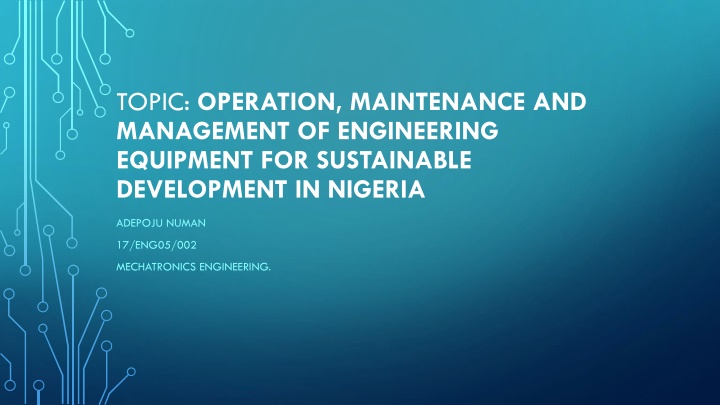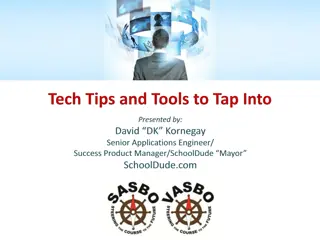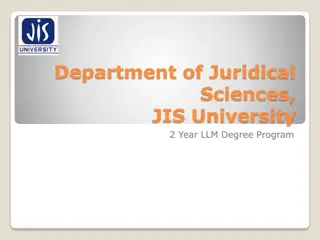
Operation, Maintenance, and Management of Engineering Equipment for Sustainable Development
Discover the importance and challenges of sustainable development in Nigeria with a focus on engineering equipment and operations. Learn about the principles guiding engineers in achieving sustainability and enhancing development prospects.
Download Presentation

Please find below an Image/Link to download the presentation.
The content on the website is provided AS IS for your information and personal use only. It may not be sold, licensed, or shared on other websites without obtaining consent from the author. If you encounter any issues during the download, it is possible that the publisher has removed the file from their server.
You are allowed to download the files provided on this website for personal or commercial use, subject to the condition that they are used lawfully. All files are the property of their respective owners.
The content on the website is provided AS IS for your information and personal use only. It may not be sold, licensed, or shared on other websites without obtaining consent from the author.
E N D
Presentation Transcript
TOPIC: OPERATION, MAINTENANCE AND MANAGEMENT OF ENGINEERING EQUIPMENT FOR SUSTAINABLE DEVELOPMENT IN NIGERIA ADEPOJU NUMAN 17/ENG05/002 MECHATRONICS ENGINEERING.
TABLE OF CONTENT CHAPTER 1: Introduction Sustainable Environment And Why? CHAPTER 2: Challenges and prospects for sustainable development CHAPTER 3: Principles to Guide Engineers. CHAPTER 4: Conclusion.
CHAPTER1 INTRODUCTION Who is an Engineer? An engineer is a person who uses scientific knowledge to design, construct, and maintain engines and machines or structures such as roads, railways, and bridges. An engineer is a person who repairs mechanical or electrical devices. They send a service engineer to fix the disk drive.nes and machines or structures such as roads, railways, and bridges. An engineer is a person who repairs mechanical or electrical devices. They send a service engineer to fix the disk drive.
WHAT IS SUSTAINABLE DEVELOPMENT? The term sustainable development was first proposed by the World Commission on Environment and Development (WCED) in its 1987 report Our Common Future (also known as the Brundtland Commission report). WCED, which included 23 members from 22 countries, was formed by the United Nations in 1984, and for three years studied the conflicts between growing global environmental problems and the needs of less-developed nations. WCED s widely used definition of sustainable development is: Meeting the needs of the present without compromising the ability of future generations to meet their own needs. Since 1987, there have been many efforts to explain and amplify what is meant by sustainable development. To an engineer, a sustainable system is one that is either in equilibrium, or one that changes slowly at a tolerable rate. This concept of sus-tainability is best illustrated by natural ecosystems, which consist of nearly closed loops that change slowly. For example, in the food cycle of plants and animals, plants grow in the presence of sunlight, moisture and nutrients and are then consumed by insects and herbivores which, in turn, are eaten by successively larger animals. The resulting natural waste products replenish the nutrients, which allows plants to grow and the cycle to begin again. If humans are to achieve sustainable development, we will have to adopt patterns that reflect these natural processes. The roles of engineers in sustainable development can be illustrated by a closed-loop human ecosystem that mimics natural systems. This model of a closed-loop ecosystem was first proposed in 1990.
CHAPTER 2 CHALLENGES FACED AND PROSPECTS Often, mechanical, electronic and software engineers in many companies are in different locations of the company. Better still, in some cases, they may be in the same building or the same office but the chances are they live in different worlds, speaking different languages and therefore cannot effectively communicate with each other when it comes to product design or problem solving. Simply because they come from different backgrounds knowing remarkably little about other related disciplines. For instance, when the Mechanical engineers design a system they pass it over to the Electrical/Electronic engineers to design and fit the control systems and they, in turn, pass it over to the Software engineers to write the control program. This serial and disjointed engineering practice result in producing an un-optimized product or solution. To overcome these difficulties, Mechatronics evolves as a trans-disciplinary approach to solving engineering problem based on open communication systems and concurrent practices, with the overall benefit of designing and providing better engineering products and services. WHY DO WE NEEED EQUIPMENTS? As engineers who advance every day, we must have specific tools to ensure better work and efficiency of our work so as to produce a good job. Does one see a farmer without a hoe or A Teacher without books? The same as for an engineer, tools and equipment are very key to get a job done easier and faster. No tools means no work for engineers. And no job for engineers means no sustainable and efficient development in the environment or in this case country. So as to get this government can also be of help because they hold a higher percent of the world s financial services.
CHAPTER 3 PRINCIPLES TO GUIDE ENGINEERS
CHAPTER 4 CONCLUSION Technology has remained one of the most essential ingredients to attaining national development and self-sufficiency. Nowadays, the trend in manufacturing and services has shifted to the use of automated and intelligent production plants, which is mechatronics. This has been recognized early enough by many countries (such as China, India, Thailand, Singapore, Malaysia, among others) that were classified as developing countries some few years back, but most of which are today providing Hi-Tec products and services to the so called industrialized nations of yester years. For the simple reason that they embraced technological transformation at the appropriate time act swiftly. It is still not late for Nigeria to take dressing from these countries. The benefits of establishing mechatronics education in Nigeria are numerous. Sustainability is referred to both explicitly and implicitly in several Engineering Council documents, including the UK Standard for Professional Engineering Competence (UK SPEC), The Accreditation of Higher Education






















